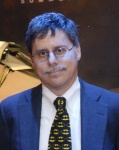
A few weeks ago at the San Diego Comic-Con, we sat down with DC President and Publisher Paul Levitz for our annual talk about the state of the comic business and DC's place in it. In Part 4, we talk about DC's film pipeline and strategy, Levitz's take on DC's upcoming releases, and how the changes in the market are changing comics. In Part 1, we talked about the current state of the market and its prospects. In Part 2, we talked about DC's investments in Webcomics. In Part 3, we talked about DC's investment in Japan, and how that relates to its strategy for a flow of content for its CMX line, the launch of DC's new Minx imprint, and the opportunities for cross-fertilization of content and customers with MMORPGs.
We generally have a conversation in these interviews about the flow of filmed entertainment and what's going on there. One observation would be that there's a pretty different strategy between DC and Marvel in terms of the number of films that you're making and we wonder if that's a conscious strategy or if that's just how things are falling as far as movies getting made and financed and done?
I think a lot of it is just how it happens to have worked out in different periods. This happens to be a quiet year for us on the movie front. In terms of exhibition the only thing out there that touches on our library is Stardust, which is really at a step removed from us. We didn't have a giant involvement in that process. Neil had kept the film rights himself when the book was published. But we ran through five films in the last two years before that, all of which were both creatively and commercially successful, which is a pretty healthy load. We're in production on the next Batman. You'll hear a lot of information about Watchmen and what's going on with that.
We have several other projects that are sitting on the simmer button. You've seen a lot in the trade press in the last couple of weeks, announcements of different things in different stages of development. Some more stuff on Y, some more stuff on Jonah Hex in one of the trades this week.
Certainly there are differences in the strategies between the two companies in film and television, but I don't think there's a particular target difference of the world would be better with one movie a year, three movies a year. Marvel's release pattern was very much impacted in the last year or two by the multiplicity of studios they were doing business with. I don't know that it's exactly the pattern they would have chosen if they were sitting there at the beginning and said 'we want to target it for this year or not.'
Our pattern is somewhat different because we do most of our work with our corporate affiliates, but it's all unpredictable over time. The Watchmen movie goes back to a twenty year old contract that we did with Fox, and it just migrated over time into this fashion. We try to serve them up when they're ready.
Up to now in this interview, we've wandered around the world and the different ways that you present comic content. Let's talk about comic books a little bit. What have you got coming out in the next six to twelve months that you're most excited about editorially?
I'm never the right guy on the comics themselves because I live so much in the projects in the early stage of development rather than as they sit there getting ripe. One of the fun things that I read recently was the early production material on
The DCU side of life, I just spent a couple of days with Dan and his key writers talking about some of the initiatives that are happening there for the next couple of years. There's a wonderfully talented crew attached to it, and some fun stuff coming from that that we haven't announced.
Wildstorm announced the comic book World of Warcraft project and the publication of Heroes, which I think is another good crossover book because it's one of the most successful storytelling uses of our kind of material that didn't launch from comics themselves. Bringing it back full circle will be a very positive step, very successful project, and again something good to bring people in and get them excited.
So I think we're touching a lot of the bases, as is really our goal. I'm enormously curious about what comes out in print from both Flex and Zuda, but at this point I don't know much more about that than you do. It's just sort of sitting there on the edge and saying 'Some of that's going to be really cool, do we get to do that now?'
How are the changes in the market that we've talked about are changing comics?
We're at a moment where we can touch so many different things with comics. It's as though we've been living in a world where there are one and a half compass points available on the whole damn compass for years and years and everywhere else was 'here there be monsters' scribbled on the map. Nobody really knew. There were a few wonderful pioneers who were going out, trying to do stuff. Then manga poked through, and the little bit of a point that was the literary comics began being worked harder and poked through with more energy, and now you're sitting there and even the stuff that was unknown before is no longer unapproachable.
Our means of distribution to reach those audiences, our means of publicity for telling people about it, are so much more available to us as a medium that you're really sitting there as a publisher saying, 'what can I do? I'm good at comics. I'm good at the process of connecting creative people to audiences. What do I choose to do next? East? West? Northwest? All of them?' You can't do all of them at the same time, but we're trying to take advantage of as much of the great circle of the compass as we can, to use our skills to explore all these opportunities and become a good publisher in all of the portions of the comics world that are available.
We were thinking back to twenty-five years ago recently because we were asked to do some recollections of when we first published Nexus and of how that came about, and the story was that Baron and Rude came to us with a story about an encyclopedia salesman and we said 'This is never going to sell, you've got to do superheroes.' So they did superheroes, and I think what you're saying is, now maybe we could publish the encyclopedia salesman story.
I think we're at a time where a great encyclopedia salesman story can be told. Will it sell as much as a superhero? Probably not today, but it can be told, and that's a wonderful thing. My first exposure to manga, and I've said this before in interviews, was Barefoot Gen and you look at the power of that and the social impact of that as a story. American comics had no vehicles for doing that when I came into comics. Underground comics might've been able to try a little eight page story touching on a thing like that, but no one could do a serious work about that.
It's all evolved in our time in this business, and if there's a great story of an encyclopedia salesman, there's a publisher willing to take a chance at it at the moment, I suspect, or there's a way to put it up as your own Webcomic and see if you can connect it to the audience, and that makes this a marvelous time to be living in--an opportunity for creative people and for comic book readers to explore the ranges of their imagination. We want to do what we can to be as important a part of that process as we can be.







